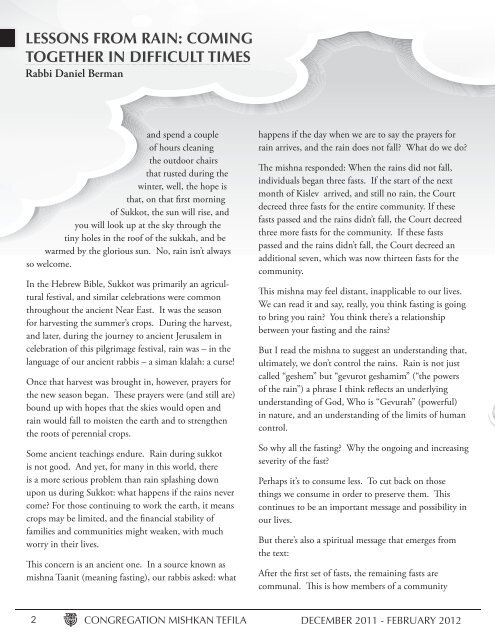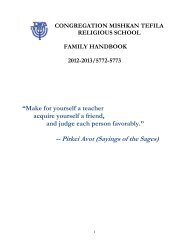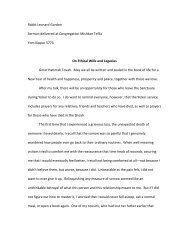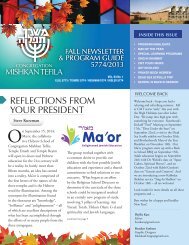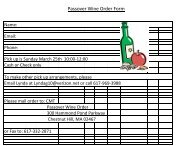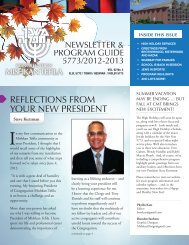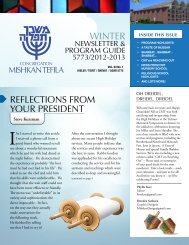December/January/February 2011-2012 - Congregation Mishkan ...
December/January/February 2011-2012 - Congregation Mishkan ...
December/January/February 2011-2012 - Congregation Mishkan ...
Create successful ePaper yourself
Turn your PDF publications into a flip-book with our unique Google optimized e-Paper software.
LESSONS FROM RAIN: COMING<br />
TOGETHER IN DIFFICULT TIMES<br />
Rabbi Daniel Berman<br />
and spend a couple<br />
of hours cleaning<br />
the outdoor chairs<br />
that rusted during the<br />
winter, well, the hope is<br />
that, on that first morning<br />
of Sukkot, the sun will rise, and<br />
you will look up at the sky through the<br />
tiny holes in the roof of the sukkah, and be<br />
warmed by the glorious sun. No, rain isn’t always<br />
so welcome.<br />
In the Hebrew Bible, Sukkot was primarily an agricultural<br />
festival, and similar celebrations were common<br />
throughout the ancient Near East. It was the season<br />
for harvesting the summer’s crops. During the harvest,<br />
and later, during the journey to ancient Jerusalem in<br />
celebration of this pilgrimage festival, rain was – in the<br />
language of our ancient rabbis – a siman klalah: a curse!<br />
Once that harvest was brought in, however, prayers for<br />
the new season began. These prayers were (and still are)<br />
bound up with hopes that the skies would open and<br />
rain would fall to moisten the earth and to strengthen<br />
the roots of perennial crops.<br />
Some ancient teachings endure. Rain during sukkot<br />
is not good. And yet, for many in this world, there<br />
is a more serious problem than rain splashing down<br />
upon us during Sukkot: what happens if the rains never<br />
come? For those continuing to work the earth, it means<br />
crops may be limited, and the financial stability of<br />
families and communities might weaken, with much<br />
worry in their lives.<br />
This concern is an ancient one. In a source known as<br />
mishna Taanit (meaning fasting), our rabbis asked: what<br />
happens if the day when we are to say the prayers for<br />
rain arrives, and the rain does not fall? What do we do?<br />
The mishna responded: When the rains did not fall,<br />
individuals began three fasts. If the start of the next<br />
month of Kislev arrived, and still no rain, the Court<br />
decreed three fasts for the entire community. If these<br />
fasts passed and the rains didn’t fall, the Court decreed<br />
three more fasts for the community. If these fasts<br />
passed and the rains didn’t fall, the Court decreed an<br />
additional seven, which was now thirteen fasts for the<br />
community.<br />
This mishna may feel distant, inapplicable to our lives.<br />
We can read it and say, really, you think fasting is going<br />
to bring you rain? You think there’s a relationship<br />
between your fasting and the rains?<br />
But I read the mishna to suggest an understanding that,<br />
ultimately, we don’t control the rains. Rain is not just<br />
called “geshem” but “gevurot geshamim” (“the powers<br />
of the rain”) a phrase I think reflects an underlying<br />
understanding of God, Who is “Gevurah” (powerful)<br />
in nature, and an understanding of the limits of human<br />
control.<br />
So why all the fasting? Why the ongoing and increasing<br />
severity of the fast?<br />
Perhaps it’s to consume less. To cut back on those<br />
things we consume in order to preserve them. This<br />
continues to be an important message and possibility in<br />
our lives.<br />
But there’s also a spiritual message that emerges from<br />
the text:<br />
After the first set of fasts, the remaining fasts are<br />
communal. This is how members of a community<br />
2<br />
CONGREGATION<br />
MISHKAN TEFILA<br />
CONGREGATION MISHKAN TEFILA DECEMBER <strong>2011</strong> - FEBRUARY <strong>2012</strong>


